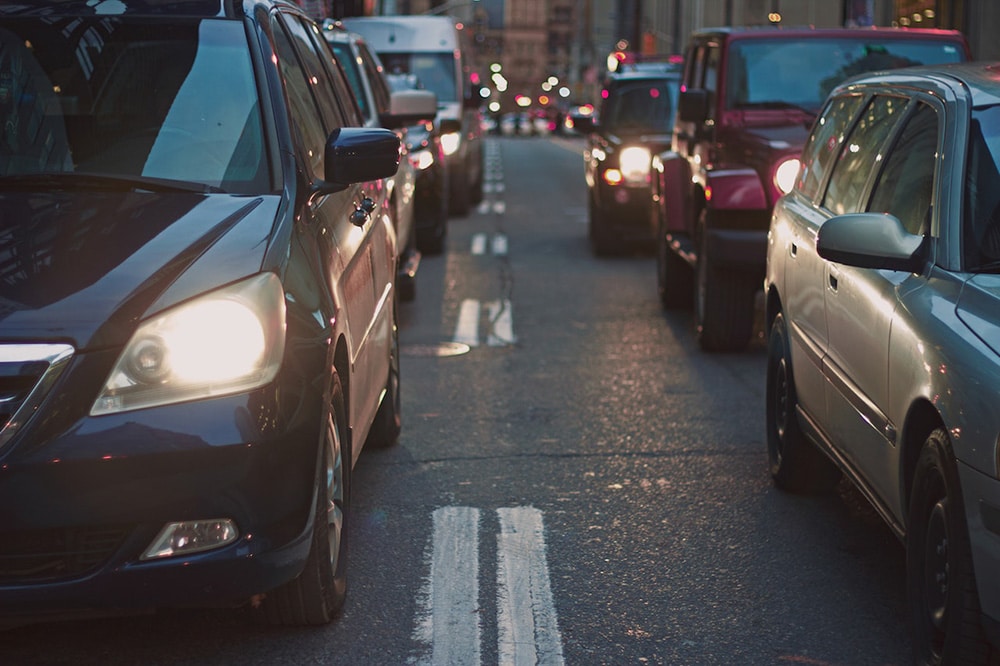What Should You Do if Someone Tailgates You?
There are few experiences more uncomfortable than looking in your rearview mirror to see a car following you much too closely. There is a reason you feel so viscerally uncomfortable when another car is riding close to your rear bumper—it puts you at a much higher risk for being involved in an accident.
Tailgating is one of the most common causes of rear-end collisions. Here is some advice on what you should do if you’re being tailgated:
What Is Tailgating?
At its most basic, tailgating can be defined as when a driver follows too close to another vehicle. A driver who is tailgating another vehicle will not have enough room or time to react and then stop in time to prevent an accident if the driver in front of them needs to come to a stop. Although there is no specific distance that defines tailgating, a good rule of thumb is to follow the three-second rule.
A tailgating driver will leave much less than three seconds of travel time between their vehicle and the vehicle in front of them. Depending on how close another driver is, you might not even be able to see the rear vehicle’s headlights.
What To Do if Someone Tailgates You
Your priority when dealing with a tailgating driver should always be to safely move out of the way and let the other driver pass. It does not matter if the other driver is speeding or acting in a way that you believe is inconsistent with the law or rules of the road, your first concern should be the safety of you and your passengers.
Avoid doing any of the following when dealing with a tailgating driver:
- Purposely slowing down
- Making eye contact with the other driver in the rearview mirror
- Making rude gestures
- Tapping your brakes, also known as brake checking
These actions are more likely to cause an accident than they are to make the other driver slow down or increase their following distance. While every driver is responsible for their own actions behind the wheel, taking matters into your own hands by making rude gestures or yelling could also increase your chances of being involved in a road rage incident.
Instead, you should do the following:
- Keep your distance. As an alert and focused driver, you should be constantly scanning the road around you for potential hazards. If you spot a particularly aggressive driver, do your best to maintain your distance and get out of their way. Be cautious when moving out of the way, though. You’ll want to avoid engaging in dangerous or risky behaviors yourself.
- Remain calm. While this might be easier said than done, remaining calm is one of the best things you can do when another driver is tailgating you. Keep both hands firmly on the wheel and minimize any distractions, including your radio. Focus on slowing your breathing. When you keep your cool, you’ll be better equipped to deal with the issue at hand.
- Keep a steady speed. The last thing you want is for the tailgater to have to guess what speed you will be traveling at next. Try to maintain as steady of a speed as possible, and if you have to change your speed try to do so gradually. Keeping a consistent, steady speed will also create a better opportunity for the tailgater to safely pass you when possible.
- Merge into another lane. Locate an opening in an adjoining lane, turn on your blinker to indicate your next move, and then merge when it is safe to do so. If you need to speed up to merge into an adjoining lane, slowly increase your speed. Do not cut off other drivers as you move over and do not slam your foot down on the gas pedal. Increasing your speed sharply or suddenly can be dangerous or interpreted as an aggressive move on your part and may only make the situation worse.
- Pull over on the side of the road only as a last resort. If you are on a two-lane highway and the tailgating driver is unable to pass you, consider pulling over onto the shoulder. Only attempt this move if you are able to safely maneuver your car onto the shoulder without increasing your chances of causing an accident. Exercise extreme caution when pulling over. If the tailgating driver is engaged in road rage, they may pull over as well to try to confront you. Ask your passenger to be ready to call 911 if necessary, and do not pull over if you believe your life could be at risk.
No one enjoys sharing the road with a tailgating driver. Make sure to only consider moving out of the way or away from tailgating drivers when you know it is safe to do so. You want to avoid taking unnecessary risks or actually becoming a tailgating driver in an effort to get out of the way of another tailgating driver.
Tailgating’s Role in Rear-End Collisions
There is no disputing the fact that tailgating plays a role in rear-end collisions. One study found that tailgating (specifically when drivers left less than one second of headway) was present in 10% of rear-end collisions that involved hard braking in the leading car. According to the National Highway Traffic Safety Administration (NHTSA), 28% of all car accidents are classified as rear-end collisions.
Drivers also seem acutely aware of the dangers associated with tailgating. In a survey conducted by NHTSA, researchers found that 60% of drivers reported that another driver’s behavior had threatened their safety over the past year. Another 61% said they felt that there was insufficient enforcement of the law in regard to tailgating.
Compensation for a Tailgating Accident
Every driver owes a duty of reasonable care to all other drivers and passengers on the road. When a driver violates that duty of care and causes an accident by tailgating, speeding, driving under the influence of alcohol, or otherwise acting negligently or recklessly, victims can hold them responsible and accountable for the damages those drivers cause.
Recovering compensation for your medical bills, lost wages, pain and suffering, loss of a normal life, disability and more is important when you are the victim of an automobile collision. At Krzak Rundio Gorman, Injury Attorneys, we won’t let the insurance company pressure you into accepting anything less than the full compensation you deserve. Contact us today to schedule a free and confidential initial consultation with one of our car accident lawyers.











